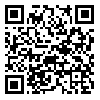BibTeX | RIS | EndNote | Medlars | ProCite | Reference Manager | RefWorks
Send citation to:
URL: http://irj.uswr.ac.ir/article-1-17-en.html
2- Tehran Institute of Psychiatrics and Center of Mental Health Research, Tehran, Iran.
Objectives: The present research is aimed at surveying the role of (internal and external) religious orientation in the mental health and the extent of depression in elderly people residing in welfare centers and the society.
Methods: The study has been conducted through post-event and correlation method by using stochastic and cluster sampling in 230 cases of elderly people at senior citizens` homes, affiliated with the Welfare Organization, and public places (mosques and parks) which are gathering centers for the elderly people of society, both male and female. The cases were initially screened in terms of recognition complications. Then 28-question tests on general health and depression of Beck and Alport`s test on religious approach were completed and the results were analyzed by using Pierson and Manvitni`s dependent statistical tests.
Results: Results showed that there is a significant correlation between the religious orientation and depression of the elderly people. That is, the more the scores of external religious orientation rise, the more the scores of disorder in mental health and depression increase. There is also a meaningful difference between mental health, depression and religious orientation of the elderly people who are residence and non-residence of the society. That is, the elderly people who live in the centers enjoy a more external religious orientation and disorder of mental health and more depression as compared to the group of the elderly people residing in the society.
Discussion: The external religious belief has a correlation with disorder in the mental health and depression as well as internal religious belief. Moreover, mental disorders and depression among the resident elderly people are higher than non residents, while resident elderly people have a more external religious approach.
Received: 2007/06/2 | Accepted: 2007/07/12 | Published: 2007/09/1





